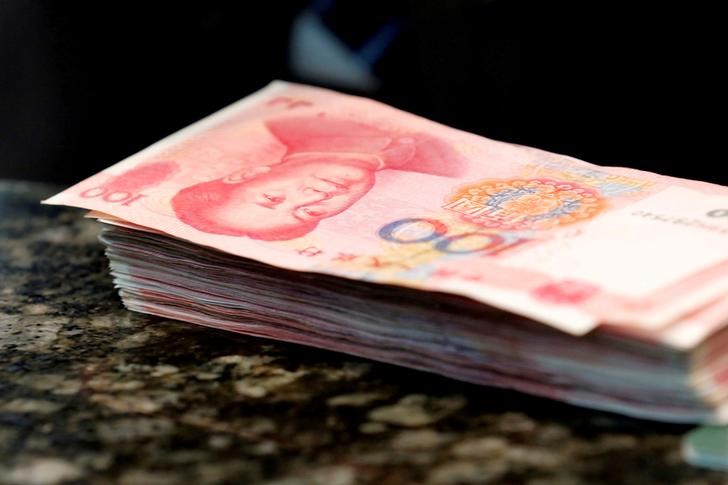
FILE PHOTO – Chinese 100 yuan banknotes are seen on a counter of a branch of a commercial bank in Beijing, China, March 30, 2016. REUTERS/Kim Kyung-Hoon/File Photo
March 13, 2018
By Shu Zhang and Se Young Lee
BEIJING (Reuters) – China said it will merge its banking and insurance regulators and create a new agricultural and rural village ministry, a parliament document released on Tuesday showed, among a number of proposed changes in the biggest ministry shake-up in years.
China will also transfer some of the banking and insurance regulators’ roles to the central bank, the document showed, in a long-awaited move to streamline and tighten oversight of the financial system in the world’s second-biggest economy.
Since the beginning of last year, Beijing has cracked down on leverage and risky market practices, with China’s financial regulators releasing a flurry of new rules in an attempt to rein in risks.
China is restructuring the responsibilities, roles and powers of its state institutions to make them more efficient. President Xi Jinping’s top economic adviser, Liu He, said that such reform would be profound.
On Sunday, China removed presidential term limits from its constitution, giving Xi the right to remain in office indefinitely, and confirming his status as the country’s most powerful leader since Mao Zedong died more than 40 years ago.
“Deepening the reform of the party and state institutions is an inevitable requirement for strengthening the long-term governance of the party,” Liu said in the commentary in the official People’s Daily.
The government will create seven new ministries: natural resources; ecological environment; emergency management; agriculture and rural affairs; culture and tourism; veterans affairs; and the National Health Commission.
The ministry shake-up also includes the creation of a new immigration management bureau and the restructuring of the national intellectual property rights bureau.
China has also proposed forming a national markets supervision management bureau, which will take on broad responsibilities including antitrust and product safety.
The securities and state assets regulators were not mentioned among the proposed changes.
The proposed changes outlined in the document will be discussed in parliament on Tuesday, and are expected to be formally approved by the largely rubber-stamp parliament on Saturday.
When the plan is passed, the cabinet will consist of 26 ministries and commissions in addition to the General Office of the State Council.
NEW FINANCE REGULATOR
The merger of the China Banking Regulatory Commission (CBRC) and the China Insurance Regulatory Commission (CIRC) is aimed at resolving existing regulatory problems such as unclear responsibilities and cross-regulation, according to the document.
The new merged entity will directly report to the State Council, or cabinet.
The function of making important laws and regulations of CBRC and CIRC will be transferred to the People’s Bank of China as the central bank takes on a bigger role.
China’s financial system has become increasingly tough to regulate due to its sheer breadth. It has grown rapidly in size and complexity, emerging as one of the world’s largest with financial assets at nearly 470 percent of gross domestic product, according to the International Monetary Fund.
Companies registered as banks or insurers have also started dabbling in other areas of finance with many offering complex hybrid products and making non-traditional investments.
Many brokerages also structure wealth management products as a channel for hidden bank lending, in addition to the more traditional business of facilitating share trades and investment banking services.
Such regulatory arbitrage and risky cross-asset investments have worried policymakers.
Speculation that China was considering the creation of a super financial regulator has been rife since the Chinese stock market crash of 2015, blamed in part on poor inter-agency coordination.
(Reporting by Shu Zhang, Muyu Xu, Judy Hua and Vincent Lee; Writing by Ryan Woo; Editing by Richard Pullin and Sam Holmes)

